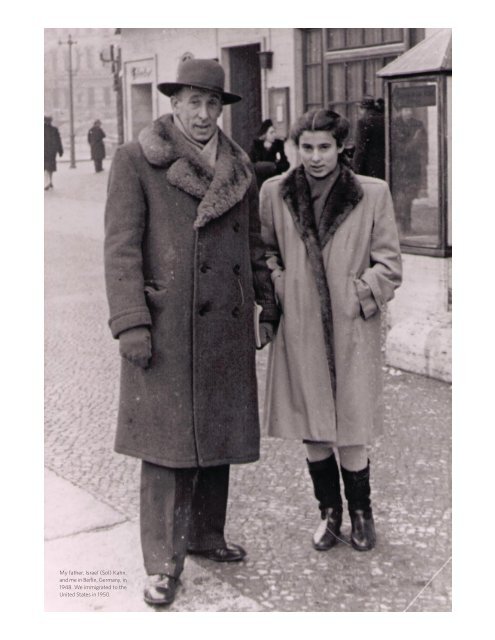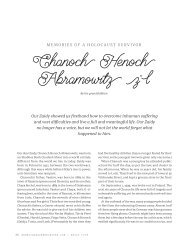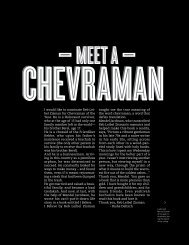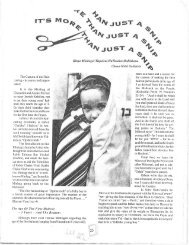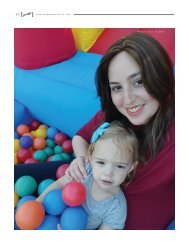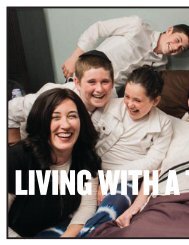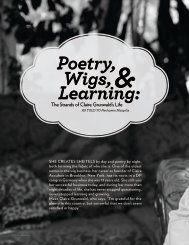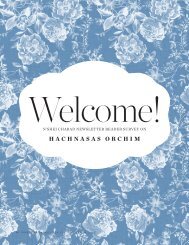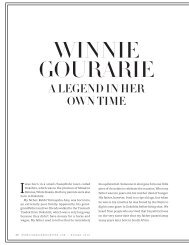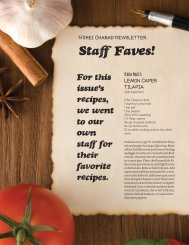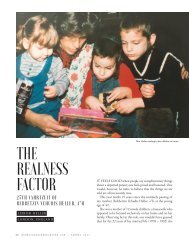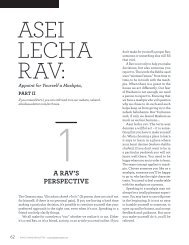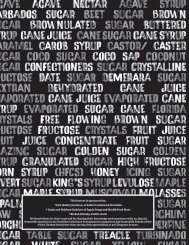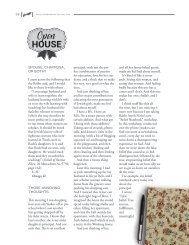N'shei, Edith Rhodes
You also want an ePaper? Increase the reach of your titles
YUMPU automatically turns print PDFs into web optimized ePapers that Google loves.
40 NSHEICHABADNEWSLETTER.COM<br />
My father, Israel (Sol) Kahn,<br />
and me in Berlin, Germany, in<br />
1948. We immigrated to the<br />
United States in 1950.
APRIL 2015<br />
41<br />
A<br />
CHILD<br />
SURVIVOR<br />
SPEAKS<br />
For the First Time<br />
<strong>Edith</strong> Kahn <strong>Rhodes</strong><br />
AGA WAS A VERY SUNNY, PLAYFUL CHILD, WHILE I<br />
WAS MORE SERIOUS AND QUIET. I LOVED MY LITTLE<br />
SISTER AND ENJOYED HAVING A PLAYMATE WHO<br />
FILLED OUR HOUSE WITH LAUGHTER.<br />
I was born in Germany in 1934. My parents<br />
were originally from Latvia, but<br />
moved to Germany when my father was<br />
invited to come there to run his uncle’s<br />
business.<br />
As Hitler came to power, life for<br />
Jews became tenuous, especially for<br />
foreigners, and my parents could not<br />
remain in Germany. Soon after my<br />
birth, we returned to Indra, Latvia, a<br />
town about 150 miles from Riga. That is<br />
where I grew up and where my younger<br />
sister Aga was born in 1936.<br />
My parents came from Orthodox and<br />
even somewhat Chassidic backgrounds.<br />
The younger generation chose to be<br />
more modern, but strongly identified<br />
with their Jewish roots and customs.<br />
We celebrated Jewish holidays and were<br />
educated in Torah. We were familiar<br />
with both Yiddish and Hebrew.<br />
Mother was a striking, stylish<br />
woman. She was an accomplished<br />
homemaker, loving and gentle. She<br />
always dressed tastefully, and dressed<br />
us in pretty attire. It pleased her to see<br />
her little girls receive admiration.<br />
As the firstborn, Father showered me<br />
with special attention and I tried my<br />
utmost always to please him. He was<br />
genuine in his dealings with people and<br />
was liked by all. On many of his trips to<br />
Riga, he took me along and I remember<br />
attending the opera with him and his<br />
sister. We were a happy family.<br />
The year 1940 brought many<br />
changes and challenges. On June 17,<br />
the Soviets marched into Latvia. Everyone<br />
had to learn new ways, to adjust to a<br />
different life politically. Everyday existence<br />
became a struggle. Commercial<br />
enterprises were nationalized, officials
42 NSHEICHABADNEWSLETTER.COM<br />
of the previous administration lost their positions, the educational<br />
curriculum was changed to fit the Soviet system<br />
and religious education was prohibited.<br />
As of December 1940, Jewish community institutions<br />
and non-communist organizations were prohibited by<br />
law. Any expression of anti-Soviet sentiment was not<br />
permitted and was usually punishable by exile to Siberia.<br />
The bourgeois (as the rich, particularly rich Jews, were<br />
referred to) were exiled to Siberia. This turned out to be<br />
a blessing, if they were able to survive the cold and brutal<br />
conditions, because they escaped the Nazi killers.<br />
DEPORTATIONS AND MIRACLES<br />
When Germany invaded Latvia on June 22, 1941, once<br />
again our lives were thrown into turmoil. I was six and a<br />
half years old; my sister Aga was about five. I didn’t really<br />
understand what was going on. My parents tried to protect<br />
us from the tragic realities, but I could see they were<br />
upset and worried.<br />
The Jews suddenly became a hunted people. We had<br />
no rights, anybody could do anything to us with impunity.<br />
Jews lost their jobs and had to turn over their positions<br />
and property to the Germans. We had to wear the Star of<br />
David, so we could be easily identified and persecuted.<br />
In no time the Germans mobilized a cooperative Latvian<br />
Auxiliary Police. These forces led the persecutions,<br />
theft and killing of Jews. Unspeakable evil was perpetrated<br />
by this willing police force, who initiated unimaginably<br />
cruel acts against Jews. When Jews were directed to relocate<br />
to other towns or streets, Latvian guards terrorized<br />
and shot those who fell behind, and many were mugged<br />
and robbed by the local peasants.<br />
Mass killings began. My five aunts, their husbands, and<br />
my cousins were killed at that time. Somehow my parents<br />
were able to hide us and themselves, and we were not<br />
found by the Germans or Latvian policemen. Besides us<br />
there were a few other Jewish families that weren’t killed<br />
in the first mass killings. Aunt Riva (my mother’s sister),<br />
her husband, and their two little boys also managed to<br />
survive that slaughter.<br />
I don’t recall how it happened, but we ended up in the<br />
Riga Ghetto. A workshop was established outside of Riga.<br />
The adults were assigned various jobs, repairing and cleaning<br />
uniforms. This lasted for about a year to a year and a<br />
half. My sister and I, my two little cousins and some other<br />
children still survived, but we did not play much and our<br />
lives were not carefree.<br />
Our daily existence was full of deprivation and the<br />
fear of being killed. One of my terrifying memories is<br />
when aunt Lena was accosted by her building’s janitor<br />
who wanted to kill her for her apartment. She ran away<br />
and melted into a group of Jews in the street. But then<br />
that group was all taken to the outskirts of Riga where all<br />
were shot. Lena managed to detach from that group and<br />
return to us.<br />
One day a truck with Nazi soldiers arrived at the ghetto
APRIL 2015<br />
43<br />
From left to right: 1. My father Israel (Sol) and my mother<br />
Paula with me at about six months old.<br />
2. Me as a baby with my maternal grandmother Zippa<br />
(Ziporah) Rosen-Perman.<br />
3. The only existing picture of my baby sister Aga Hy”d.<br />
4. My aunt and stepmother Riva and me.<br />
and announced, “All children are to be taken to a children’s<br />
camp. Get them ready.” People knew this was a lie. They<br />
were going to be killed.<br />
The head of the workshop, a Jewish man and a friend<br />
of my father, noted that the number of children that were<br />
to be picked up was one less than there actually were.<br />
He quickly realized he could save one child. Of course it<br />
couldn’t be a very small child, it had to be one who was<br />
old enough to hide and not to cry. He picked me and hid<br />
me in an industrial-size clothes dryer.<br />
Parents tried to hide their children, but the soldiers<br />
didn’t leave until everybody was found. My aunt tried to<br />
hide her two little boys, but they also were found and put<br />
in the truck along with my sister Aga. The heartbreak of<br />
the parents can only be imagined. They knew they would<br />
never see their children again. After the truck left, it was<br />
safe for me to come out. I was very sad and felt very bad<br />
and uncomfortable that I was the only child left in the<br />
ghetto, the only one still together with her parents.<br />
Shortly after that the ghetto was closed. We were taken<br />
to a boat that took us to a concentration camp near Danzig<br />
in Germany. Conditions on the boat were very bad,<br />
unbearable sometimes. After all we had been through,<br />
now this. I remember one young girl of about 17 who just<br />
went crazy. She was singing, laughing, and then she was<br />
giving a sermon. She just completely lost her mind. As we<br />
passed villages and towns along the waterway, we saw people<br />
doing ordinary things. Children playing outside their<br />
houses, people eating. As if nothing had ever happened.<br />
I remember my mother saying to me that there were still<br />
some people living normal lives though we were living in<br />
an insane reality. For example, we had no toilets. We had<br />
one bucket for people to go to the bathroom in. And these<br />
were civilized and dignified people, so you can imagine<br />
how terrible that was.<br />
ARRIVAL IN STUTTHOF<br />
When we arrived in the Stutthof Concentration Camp, the<br />
men and women were separated. Then came the selection<br />
process. People were separated into two groups. As we<br />
quickly learned, one group was sent to work and live and<br />
the other to be destroyed, to die. Those who were young and<br />
healthy were to be used for slave labor. Those who were old<br />
and weak were directed to the group that was to be killed.<br />
My mother and aunt were selected for the work group.<br />
When my turn came, the young soldier who had to decide<br />
where I should go didn’t seem to know into which group to<br />
send me. He told me to stand there and he would ask his<br />
supervisor. Aunt Riva, who was nearby, quickly grabbed<br />
my hand and pulled me into her group. In all the noise
44 NSHEICHABADNEWSLETTER.COM<br />
and confusion, the soldier didn’t notice. Her quick thinking<br />
and brave action saved my life. My mother, Aunt Riva,<br />
and I were now among many in Stutthof. Mother and Aunt<br />
Riva were always with me. Their presence and caring protected<br />
me and I felt safe. They shared whatever little food<br />
they had with me.<br />
Although it was a very difficult environment in the<br />
concentration camp, I somehow, after a while, was able<br />
to adapt to the circumstances. People were dying left and<br />
right and there were piles of dead bodies everywhere.<br />
Today I would be afraid to see one dead body, but then,<br />
after a while, I didn’t think much about walking right next<br />
to a pile of dead bodies.<br />
I was eight years old. There was one other young girl<br />
in Stutthof. She was very pretty and people made a fuss<br />
over her. I remember thinking that everybody was making<br />
a fuss over her and nobody was paying attention to<br />
me, and I felt bad about it. But later, the little girl disappeared.<br />
Children weren’t supposed to be there and she was<br />
discovered and probably killed. My looks did not attract<br />
much attention, and it seems I blended into the dreary<br />
scenery which saved my life.<br />
One day, one of the soldiers somehow got a few geese,<br />
and he asked me to watch them. And so for three or four<br />
days, I was taking care of the geese as best I could, trying<br />
to keep them from running away. I had a difficult time<br />
keeping the geese from running away. I was given a stick<br />
or something like that. Somehow I did keep them in the<br />
general area. I remember the German soldier was feeding<br />
them grapes and, of course, no grapes for me. I understood<br />
that this was how it had to be because I was a Jew.<br />
A MIRACULOUS REUNION<br />
One day I was separated from my mother and aunt and<br />
was put in with a group that was transferred to a different<br />
camp. It was terrifying for me as I was only nine years<br />
old. I didn’t know what to do or how I would survive on<br />
my own. There was a woman there who knew my mother<br />
and she was a comfort and great help to me.<br />
Several days after the transfer, a soldier came in and<br />
announced to all, “You’re being taken to another place.<br />
You can stay here or come with me.” I didn’t know what<br />
to do. I couldn’t decide. I asked my mother’s friend for<br />
advice and she said she didn’t know which was better, to<br />
stay or to go somewhere else, to the unknown. I decided to<br />
go; I don’t know why. The soldier said, “If you are strong,<br />
you will be picked to go.” I stood on my tiptoes to appear<br />
taller and I was taken with the group that looked young<br />
and healthy. We were packed in a cattle car like sardines,<br />
with no light, and conditions were very bad. Fortunately,<br />
it wasn’t a long journey.<br />
As it turned out, we were taken back to the camp where<br />
my mother and aunt were!<br />
Every day Mother and Aunt Riva had gone to search<br />
among the new arrivals, hoping that I would somehow be<br />
among them. When they saw me in the group that arrived,<br />
they thought it was a miracle, and it was. I couldn’t have<br />
survived on my own. People all around us were dying of<br />
starvation and typhoid. My mother also became sick with<br />
this disease.<br />
We didn’t know it, but the war was coming to an end.<br />
Germany was losing the war. The Russian army was encircling<br />
this part of Germany.<br />
We were ordered to line up to be taken somewhere else.<br />
My mother was too weak to walk and I couldn’t decide if<br />
I should stay with my mother or go with my aunt. Mother<br />
insisted that I go with my aunt. After all those years of<br />
suffering and escaping death together, it was tragic to<br />
be torn away from my mother. I never saw her again. The<br />
camp was discovered and freed in May 1945. More than<br />
85,000 people died in that camp.<br />
We were led away from the advancing Russians by<br />
guards and German soldiers. Many people who were too<br />
weak to walk were shot. During January 23-24, 1945, the<br />
Russian army advanced close to Stutthof. The last two<br />
groups left on the 26th of January on the death march to<br />
Lebork, some 140 kilometers from Stutthof.<br />
The march started with 25,000 prisoners and was<br />
expected to last seven days, but it actually lasted ten days.<br />
The issued food was only enough for two days. The columns<br />
marched on through snow drifts, with the SS guards<br />
casually murdering anyone who fell behind.<br />
GREAT JOY AND GREAT SORROW<br />
We were taken to a barn for the night where we slept in<br />
the straw, grateful to finally rest. The next morning we<br />
had to continue the march. It didn’t make sense since the<br />
Russian army was surrounding the area. But then, nothing<br />
made much sense. Some Jews who tried to run away<br />
were shot and killed.<br />
One day we noticed that the guards were gone and then<br />
we saw Russian soldiers. They told us we were now free.<br />
We were free? How does one grasp this?<br />
The entire nearby town (I don’t remember its name but<br />
it was near Stutthof) was burning. The German people had<br />
fled, abandoning their homes. The camp survivors entered<br />
the abandoned houses to wash up, find clothing and get<br />
whatever food was left there. My aunt and I also entered<br />
one of these houses and rested for a day. The next day a<br />
few men in concentration camp uniforms came to look<br />
for civilian clothing. As they were talking among themselves<br />
in German, Aunt Riva heard their Latvian accent.<br />
First she asked them if they knew her brother, and they<br />
said no. She then dared to ask, “Do you know Sol Kahn?”<br />
They answered, “Yes, he is staying with us not far from<br />
here.” They led us to that house. My dear father was there.<br />
Our reunion was full of tears and joy.<br />
When my father saw us he couldn’t believe his eyes.
APRIL 2015<br />
45<br />
<strong>Edith</strong> <strong>Rhodes</strong> with daughter Ava, founding members of Chabad of Northern Palm Beach Island.<br />
This was another miracle. He was sure that no one from<br />
his family had survived. After he settled us in a place he<br />
began to search for my mother. He learned that when the<br />
Russians freed Stutthof and the ghetto, they took the sick<br />
people to the local hospital. Sadly, it was too late for her.<br />
She died in the hospital a few days later. This information<br />
was difficult for me to absorb. After seeing and experiencing<br />
all the evil and killing, somehow I hoped for another<br />
miracle, that Mother would survive.<br />
We found a little apartment that was vacated by a German<br />
family. My aunt was sick with typhus and luckily she<br />
fought it. In the meantime, Father and I walked around in<br />
the little village and talked to the other survivors. Father<br />
realized that going back to Latvia would not be a good or<br />
safe decision. Father and Aunt Riva decided to apply for<br />
visas to either the United States or Palestine, as Israel was<br />
called then, which was still under the British mandate.<br />
And, Father and Aunt Riva got married.<br />
They realized that in order to get visas we needed to<br />
be in a big city, to be close to the administrative offices, to<br />
register. We managed to resettle in Berlin, where we found<br />
a place to live. At the time Berlin was divided into Russian<br />
and American sectors, and we settled on the Russian side.<br />
Because Father spoke perfect German and Russian, the<br />
Russians hired him as a translator. He worked for them for<br />
a while until my father’s friend, a Russian officer, advised<br />
him that we better leave for the American sector of Berlin.<br />
The Russians were beginning to think that Father was<br />
a spy, because he was able<br />
to speak Russian and German<br />
so well. They were<br />
planning to arrest him and<br />
send him to Siberia. So, of<br />
course, we left and found a<br />
place on the American side<br />
of Berlin.<br />
By then, I was eleven<br />
years old. Father and Aunt<br />
Riva decided that I should<br />
start school and found a<br />
student who tutored me<br />
for a year and a half, until<br />
I was able to enter public<br />
school in 7th grade. I was<br />
very well received by the<br />
German students and even<br />
made friends, with whom<br />
I kept in contact for many<br />
years.<br />
During this time, we<br />
saw many survivors leave<br />
Germany. A friend of my<br />
father’s persuaded his<br />
relative in Cleveland to<br />
sponsor us to come to the United States and so we arrived<br />
in the summer of 1950.<br />
A NEW LIFE<br />
I was almost 16 when we came to Cleveland. To give me<br />
the best opportunities, my father asked around for the best<br />
high school in Cleveland. They told him Shaker Heights.<br />
They rented a tiny apartment in that area and I started<br />
10th grade.<br />
Even though I had learned some English in the German<br />
school, I found using the language and talking to people<br />
very difficult. But now, with a thoughtful teacher and kind<br />
students, in about three or four months I spoke fluently.<br />
I must admit that it was not easy to learn all the subjects,<br />
but with time I succeeded and it became easy. I was fortunate<br />
to get a full scholarship to Ohio State University.<br />
I made friends and built a social life where I felt comfortable.<br />
I was able to leave my past behind.<br />
In Cleveland I met a young man named Jess <strong>Rhodes</strong>.<br />
Jess started medical school at Ohio State where we got<br />
to know each other, and I realized that he was a very kind<br />
and good person. Eventually Jess proposed marriage and<br />
I accepted. I’m glad I did. I received my degree in education<br />
and Jess received his medical degree.<br />
When all his studies and his residency were completed,<br />
we settled in West Palm Beach, Florida, where<br />
Jess opened his practice. We have been married for 52<br />
years, and we still live here. Our sons Paul and Steve
46 NSHEICHABADNEWSLETTER.COM<br />
and our daughter Ava have filled our lives with affection<br />
and gifts of grandchildren: Samantha, Jesse, Stephanie,<br />
Hannan, Lola and Nina.<br />
I didn’t really want to speak about the war, other than to<br />
people who actually had similar experiences. When I was<br />
asked to speak for schools, I knew it would be too difficult<br />
for me, so I didn’t. I’m glad other people have done it, and<br />
are doing it, I’m grateful to them, but I just couldn’t do it.<br />
My husband asked me many times to give an interview<br />
but I just kept postponing it. So when my granddaughter<br />
Samantha mentioned that she might want to do an<br />
interview, and that she had learned photography and filmmaking,<br />
I decided it’s time to do it. That was when I was<br />
filmed for the documentary, “Grandma’s Untold Story.”<br />
When in 2014 I was asked to share my story for the Palm<br />
Beach Chabad House, Rabbi Zalman and Rebbetzin Hindel<br />
Levitin, it was my first time telling my experiences to<br />
a live audience.<br />
A few years back, I heard about the Child Survivors/<br />
Hidden Children group meeting in Boca Raton. I was curious<br />
to meet other children (now older adults) and feel a<br />
commonality of memories, confirming some hazy memories,<br />
recapturing the lost child within each one, and to<br />
find a way to honor the six million.<br />
I am very pleased to be part of this vital group that adds<br />
to Holocaust education efforts in Florida by bearing witness<br />
and developing books to become our voices for the<br />
future. I have witnessed evil but I know that there is also<br />
goodness and kindness. I chose to be a good human being<br />
in spite of all the suffering that I have experienced. We<br />
should not lose faith in people or G-d. We need to remain<br />
good human beings and show a better way through our<br />
contributions of charity and our commitment to our fellow<br />
Jews.■<br />
<strong>Edith</strong> and Jesse <strong>Rhodes</strong> with grandchild.<br />
Batya Lerner, D.D.S.<br />
Aron Gamss, D.D.S.<br />
ALL PHASES OF DENTISTRY<br />
WITH SPECIAL EMPHASIS ON:<br />
Esthetics<br />
Tooth Whitening, Porcelain, Etc.<br />
Prevention<br />
Fluoride, Sealants, Etc.<br />
Quality Restorative Dentistry<br />
Early to Moderate Gum Treatment<br />
Sunday & Evening<br />
Appointments<br />
Available!<br />
(718) 771-3383<br />
(718) 771-3384<br />
777 Montgomery Street<br />
Brooklyn, NY 11213


